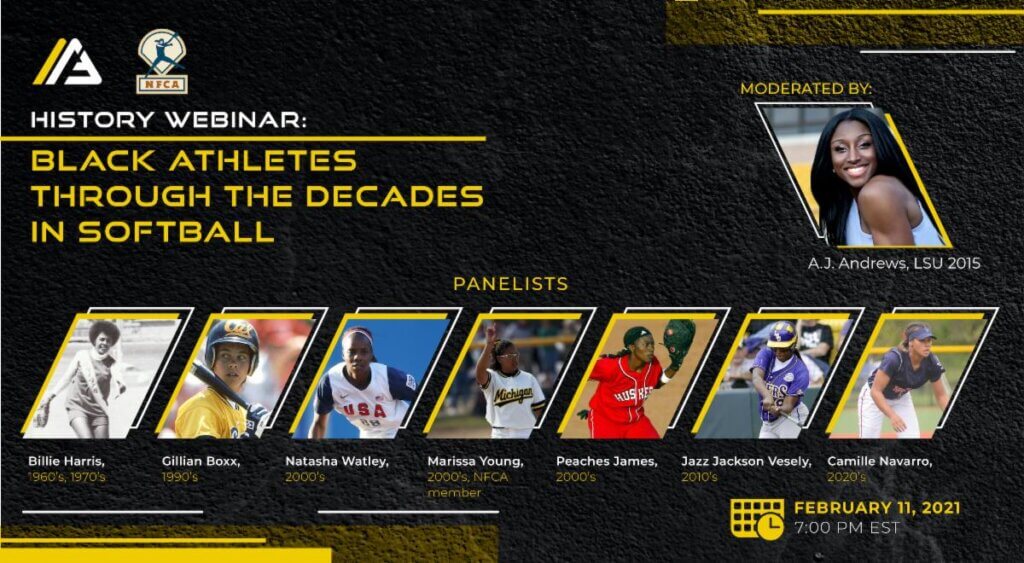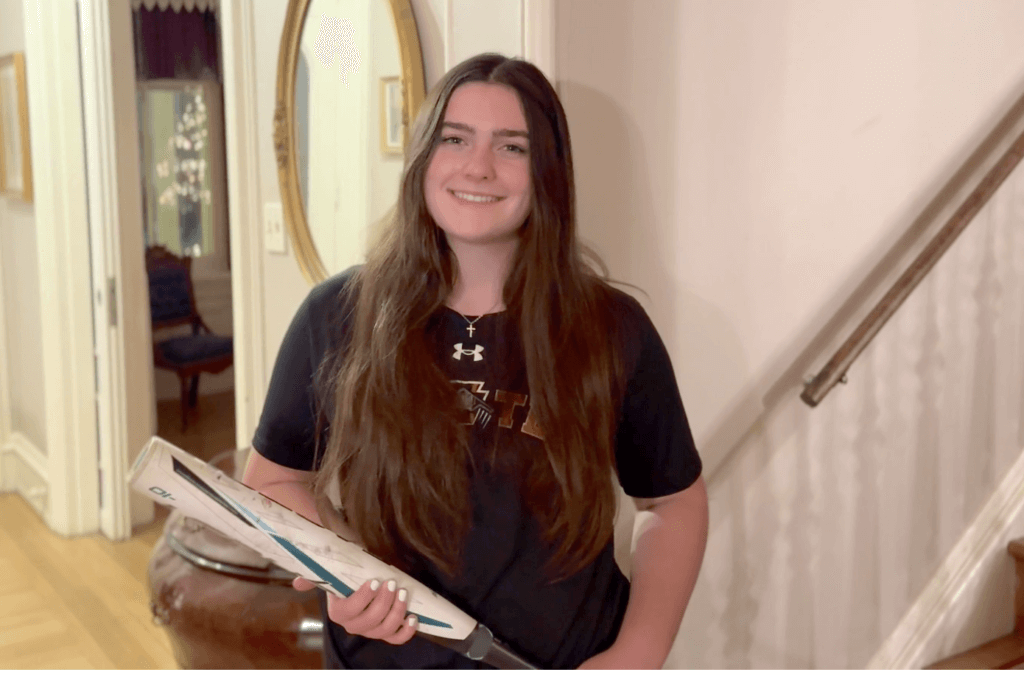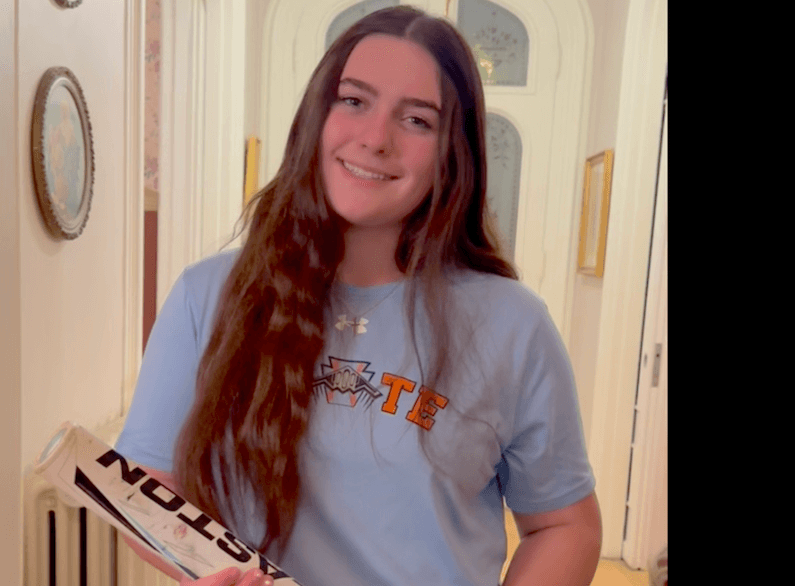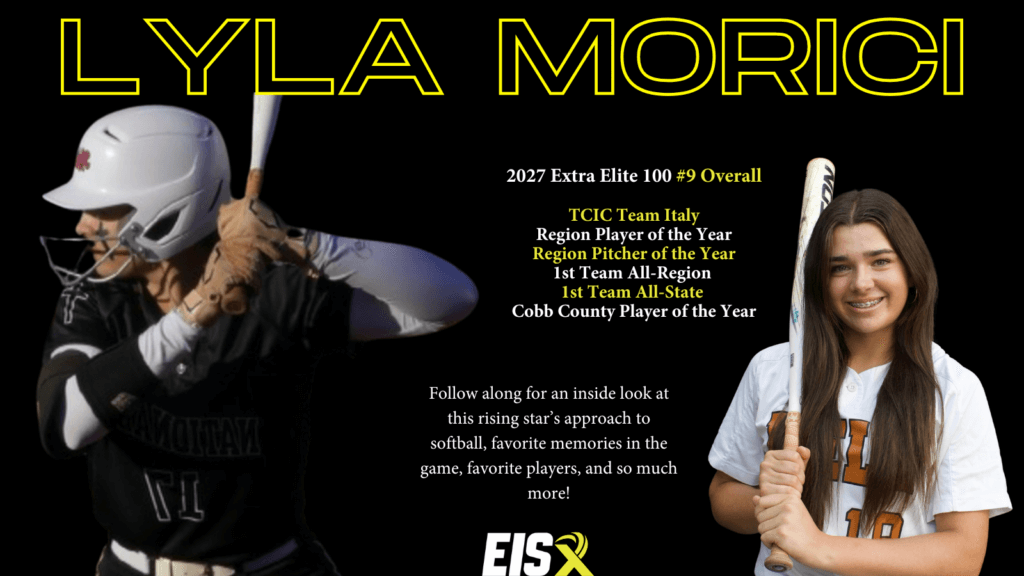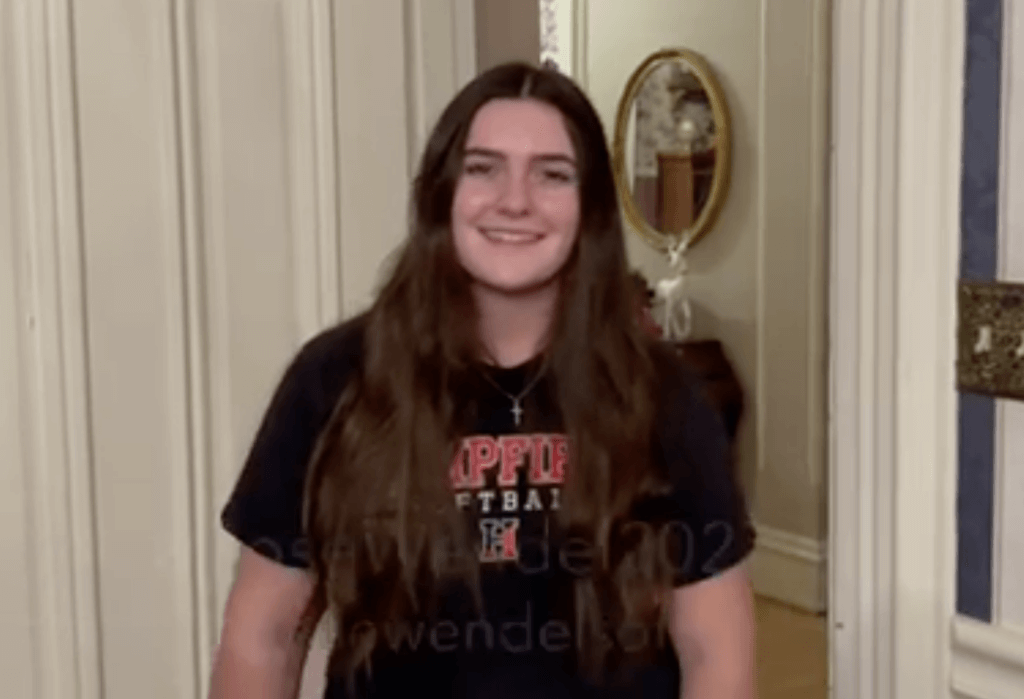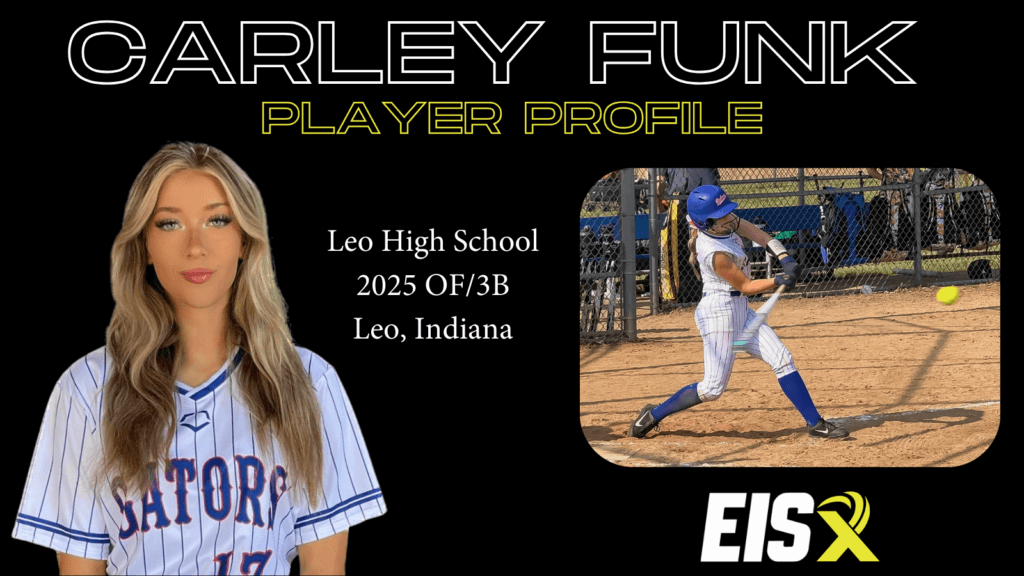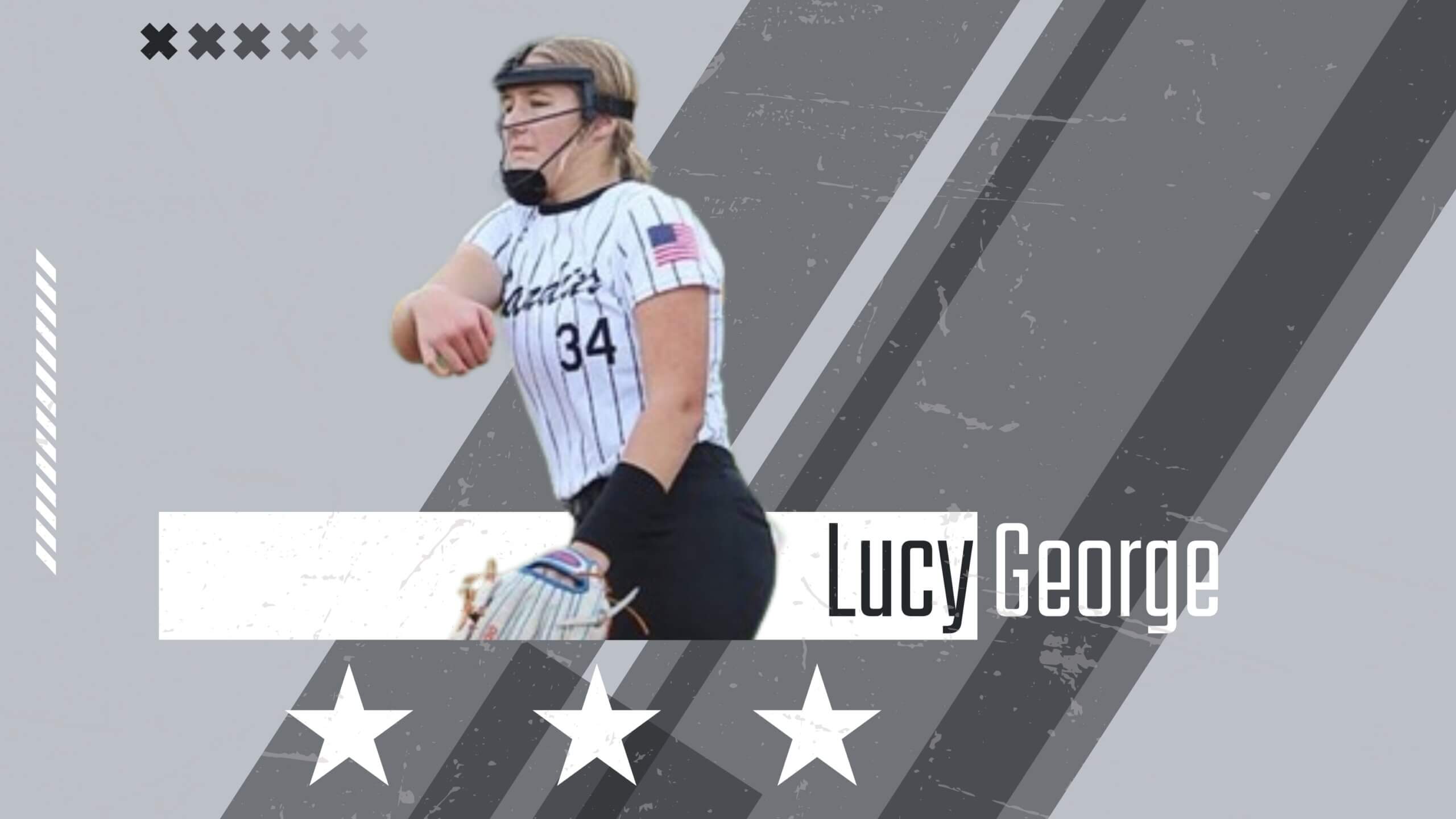
One of the best things I’ve ever seen regarding softball and its history took place two weeks ago: the “Black Athletes Through the Decades in Softball” history webinar.
The Alliance Fastpitch & NFCA co-sponsored the panel and the subsequent one-hour video which was recorded Thursday evening, February 11, 2021.
*** Click HERE to read our preview article on the webinar
Featured on the panel were over six decades of Olympians, All-Americans, National Champions, a Gold Glove winner, and trail blazers in the sport who shared their experiences—good and bad—of being a black softball player.
It was fascinating conversation full of insights everyone should take the time to watch!
AJ Andrews moderated the conversation around black softball athletes and their experiences through the decades and queried the following greats:
- Billie Harris, (1960s Women’s Majors)
- Gillian Boxx (Cal, 1995 and the first black softball Olympian)
- Natasha Watley (UCLA, 2003 and two-time Olympic medalist)
- Marissa Young (Michigan, 2003 and current Duke Head Coach)
- Peaches James (Nebraska, 2004)
- Jazz Jackson Vesely (LSU, 2010 and President & Program Director with Impact Gold Fastpitch)
- Camille Navarro (Jr. at Howard, MEAC All-Conference)
Here is the link to the complete video as it was recorded… also below are notes and excerpts I took that I felt were impactful.
— Brentt Eads, Extra Inning Softball
*****
Questions were asked by moderator AJ Andrews…
*** Personal note: this isn’t a word-for-word transcript; rather key points I wrote down that I thought were strong. If they aren’t exactly accurate and matching of the dialog, the fault is mine… but I was fascinated by the dialog and tried to copy as much as I could! – Brentt
WHAT ARE SOME CHALLENGES YOU FACED?
Billie Harris: Racism. It’s better but still underlying. It wasn’t the easiest thing to do but I took it all in stride. I was the only black girl playing with all white teams for first 15 years. Kind of tough but continue going on life through today. Players today make it as full and lively as they can, hope that softball gets to be as strong as women’s basketball
Marissa Young: Social acceptance, I felt you had to work that much harder. Looked around, you didn’t see many that looked like you.
Peaches James: I started playing at 10, grew up on the north side of Omaha, Nebraska, not a lot of African-Americans that played softball and when I brought it up I’d get, “Oh you play softball?” as it was a white girls’ sport. From a young age, I didn’t feel I had representation on either side including with my teammates.
Natasha Watley: Where I felt challenged was with marketing dollars, I was told I wasn’t marketable. Someone at a shoe company told me I wasn’t marketable…. “you’re not so and so.” Why can’t what we’re doing on the field translate to off the field? A man at a company said, “That’s not the image we’re trying to present to America.”
Jazz Jackson Vesely: My biggest challenges were positional. When I played, I wanted to be Natasha Watley, but because I was black I was told I was supposed to play the outfield. I struggled with why I had to change my position (from shortstop) because “that’s where I was supposed to play.”
Camille Navarro: Similar to Peaches: only black girl growing up tried to fit in,I couldn’t fit in and have conversations with my teammates. Now at Howard I can have those conversations.
HOW DID YOU FIND THAT CONFIDENCE?
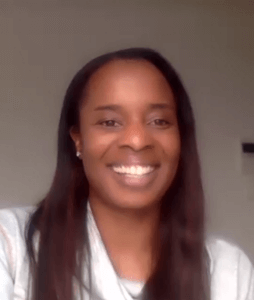
Jazz Jackson Vesely: I chose a place where I thought I could thrive, picked my school where I had confidence because they could coach people like me. I came in with a lot of confidence and had great women before me at LSU.
Marissa Young: The nature of my position, I’m used to the spotlight and was anxious to work hard and accomplish things people thought I couldn’t.
Natasha Watley: I knew that I could do incredible things on the field and that’s what matters at the end of the day. What was really important and my passion was to be the best and win medals. And have the mindset that they couldn’t deny you.
Peaches James: I almost had to be comfortable in an uncomfortable position, building my own confidence from within. I remember watching Natasha Watley play and have that keep me going. It was tough feeling that I didn’t have a place to be with my peers and be understood.
Billie Harris: (how to stay focused and keep moving forward): I loved the game and would do anything to play, shine shoes, clean the locker room. I worked at it hard, would throw a ball against the wall 3-4 hours a day. Like everyone else, I was the only black on an all-white team. Luckily, I was able to charm my way through, one of those things I had to experience and I got through OK.
WHILE PAVING THE WAY FORWARD, WHAT DIFFERENCES WERE THERE FROM WHEN YOU PLAYED TO WHAT YOU SEE HAPPENING NOW?
Marissa Young: It’s important we continue to excel with opportunities we are given. As a coach, now it’s my joy and passion to give opportunities to others to a place like Duke. It can inspire young players on and off the field that we can really do it all.
Peaches James: I do think there is a little more respect given now; when I played only games on ESPN was WCWS. Now I can see our sport and would love to see it continue to grow in diversity. I love that our sport is a little bit more recognized and more African-American girls have an opportunity to play.
WHY IS REPRESENTATION SO IMPORTANT?
Natasha Watley: Growing up I didn’t have a lot of people who looked up like me, a lot of men baseball players who were my heroes like Ozzie Smith and Fred McGriff. I was lucky that there a lot of opportunities to excel, when you have something to see and makes it easier to know what you’re striving for. Our world and country are so diverse and our sport should represent that.
Jazz Jackson Vesely: (on representation). I have players that I want to be like Shay Knighten, kids are playing so many positions and so different than it was five years ago. Now some are saying they want to be coaches and representation lets them know they can do it.
Camille Navarro: Without I wouldn’t be playing college softball. When I see others playing at the highest levels I feel like I can do that. It’s important in all realms of sports.
Billie Harris: When I played, we didn’t have scholarships in college, now girls can get education through scholarships. So many colleges now are giving scholarships and girls would love to coach or play a certain position.
HOW WE ALL FEEL ABOUT REPRESENTATION… CAN IT CONTINUE TO GROW?
Peaches James: I think continuing to uplift each other’s webinars and panels like this, I’m so inspired. Part of a FB group Black Girls Play Softball. See young girls doing so much and it’s uplifting to see so many other African American girls can be uplifted and empowered by each other.

Jazz Jackson Vesely: I think social media is a big part of that because it’s where the young kids are. Not as many kids on this webinar, there should be more, but they are on social media. Kids need to see that it’s OK to have ups and downs and that there are people like them.
AJ Andrews: The more you see, the more you can achieve!
Marissa Young: Players young and at college level need to make themselves vulnerable and find mentors. Something we didn’t have growing up, we couldn’t follow our favorite players on Instagram and now kids can do that. Just have the courage to ask.
Billie Harris: We keep encouraging ball players to keep doing what you enjoy, if you love it you’ll continue to work and work. When I see a young player on the fields, I try to give them tips and some take the advice. Encourage them to continue doing what they enjoy.
WHERE TO YOU WANT TO SEE SOFTBALL IN 10 YEARS?
Camille Navarro: I want to see us (Howard) in the WCWS!
Natasha Watley: We need to get a pro league and have more diversity. In college 8% are black athletes, would love to see it grow more. Continue to advocate for our game, in 10 years we should be more of an inclusive sport. 8% not enough, that’s not cutting it!
Peaches James: I would love that women would be able to strive to make it their career, there are so many talented softball players. I would love that someone wouldn’t have to go to a certain school to feel like they belong, to understand their hair texture or their culture.
Marissa Young: Growing diversity and seeing the sport get the recognition it deserves, where the pro game is equitable and after they’re done so they have a future long after the game.
Jazz Jackson Vesely: Coming from the youth perspective, more diversity in our coaches and more women come back and coach, more women and women of color. It can be even greater there. After they play, they should be able to do what men do, coach, commentate… hope in 5-10 years that changes.
Billie Harris: I would like to see women play and be paid the same as the men. I think in 10 years they can have a league like the men have, always dreamed of that sort of thing where women’s professional softball is doing as well as the women’s basketball. I hope it will be like basketball. They better do it in the next two years so I’m around!
Gillian Boxx (via video): I hope we can get more great facilities and keep growing the professional league, if we could get it more mainstream that would be amazing. It’s been a slow growth but need young players to keep doing what they’re doing it and keep pushing it.
WHAT WOULD YOU SAY TO YOUR YOUNGER SELF AFTER ALL YOU’VE ACHIEVED… WHAT IS IT YOU’RE MOST PROUD OF?
 Billie Harris: When I went to South Africa, I couldn’t go as myself had to go as an honorary white person. The blacks were fixing the field and couldn’t watch me play. I wasn’t allowed to talk to our people in South Africa. I’m proud of being able to sustain and appreciate the opportunities while I had a chance to go through it, being the first black in the National Softball Hall of Fame, my mom and dad were there and then inducted into four halls of fame.
Billie Harris: When I went to South Africa, I couldn’t go as myself had to go as an honorary white person. The blacks were fixing the field and couldn’t watch me play. I wasn’t allowed to talk to our people in South Africa. I’m proud of being able to sustain and appreciate the opportunities while I had a chance to go through it, being the first black in the National Softball Hall of Fame, my mom and dad were there and then inducted into four halls of fame.
Natasha Watley: To my younger self, I’d advocate to use your voice and speak up but also to loosen up and not be so uptight. I’m most proud of what I’m doing now, growing this game and showing young girls that you can be whoever you want to be, whether you’re Japanese, black or brown—this game is for everybody.
Jazz Jackson Vesely: I’m most proud of what I do now, I’m one of the only women running (a club organization) and I help girls find their place at the next level.
Marissa Young: I think raising two strong black women in this sport is my proud and joy and lead 25 women through their career and grow into women is what I’m most proud of.
Peaches James: I’ve been an introvert my entire life but proud that I’m able to use my voice now. I’ve been uncomfortable in the past but now more confident and that my children can see the representation in all walks, that they can do anything and be anything they want to be.
Camille Navarro: Similar to Peaches, finding my voice in this sport. Being at Howard teammates and coaches have helped me do that, finding my role and helping younger girls find their voice.
AJ Andrews: Black history isn’t just February, it’s all-year round!
